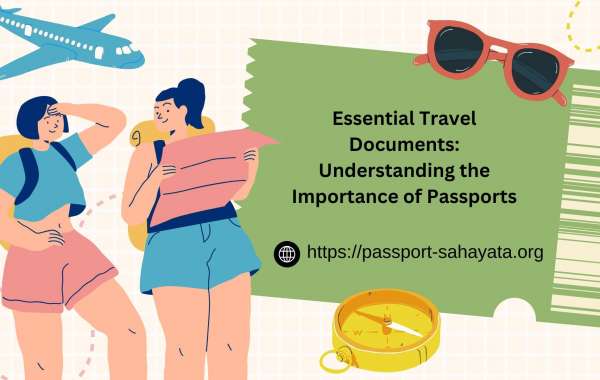In a world where people cross borders every day for tourism, education, business, or personal reasons, the passport stands as a vital travel companion. This small but powerful document is more than proof of identity—it symbolizes national belonging and provides access to global opportunities. Beyond being a travel necessity, passports connect people across cultures and foster international exchange. This article explores the rich history of passports, their essential role in modern travel, and the responsibilities that come with holding one. Start your journey today by completing your passport registration online and unlocking a world of possibilities.
A Brief History of Passports
Passports have evolved significantly over time. Their origins trace back to ancient civilizations, where rulers provided written letters granting safe passage to travelers. During the Middle Ages, such documents became more standardized, offering protection to merchants and pilgrims.
In the 20th century, passports became formalized as a means of regulating international travel. The League of Nations 1920s conference established the modern format for passports, emphasizing a uniform size, photograph inclusion, and basic personal information. Today, passports are equipped with advanced technologies, such as biometric chips, to enhance security and facilitate border control.
Why Passports Are Essential
1. Proof of Identity and Citizenship
A passport is an official government-issued document that establishes your identity and nationality. It is universally recognized and is often required to verify identity during international travel. For expatriates or travelers abroad, it is the most reliable proof of citizenship.
2. Facilitating International Travel
Passports are mandatory for crossing international borders. They provide immigration authorities with the necessary details to verify your identity, purpose of travel, and visa eligibility. Without a passport, international travel becomes impossible.
3. Access to Opportunities
Owning a passport unlocks countless opportunities for personal and professional growth:
- Education: Many students dream of studying abroad. A passport is the first step in applying for a student visa or enrolling in international universities.
- Career: Professionals often travel for job opportunities, conferences, or collaborations. A passport is essential for participating in the global workforce.
- Tourism: From iconic landmarks to hidden gems, a passport allows travelers to explore diverse cultures, cuisines, and traditions.
Passports in the Modern World
1. Technological Advancements
Modern passports are equipped with features like biometric chips containing encrypted data about the holder. These innovations make passports more secure, reducing fraud and speeding up immigration processes.
Digital passports, which store all information electronically, are also being explored. This shift aims to make travel even more seamless by reducing physical documentation.
2. Global Inequality in Passports
Not all passports are created equal. The strength of a passport determines how easily its holder can travel to other countries. For instance, citizens of countries like Japan or Germany enjoy visa-free access to many destinations, while others face significant restrictions. This disparity highlights the privileges and limitations tied to nationality.
Passport Validity and Travel Requirements
Having a valid passport is essential for smooth travel. Most countries require your passport to be valid for at least six months past your arrival date. Meeting this requirement helps you avoid problems such as being denied entry or boarding your flight.
Online services, such as passport registration online, make it easy to renew passports and check their validity. These platforms simplify the process, allowing travelers to focus on their plans rather than bureaucratic hurdles.
The Responsibilities of Passport Ownership
Owning a passport comes with responsibilities:
- Safeguarding Your Passport: A lost or stolen passport can lead to significant delays and security risks. Always store it in a safe location and carry a photocopy or digital scan as a backup.
- Adhering to Visa Regulations: Ensure you understand the visa requirements of your destination. Overstaying or violating visa terms can lead to legal complications.
- Regular Renewals: Keep track of your passport’s expiration date and renew it well before it expires to avoid travel disruptions.
The Emotional and Symbolic Significance
For many, a passport is more than a travel document—it is a symbol of freedom and empowerment. Holding a passport means having the ability to explore the world, connect with diverse cultures, and access opportunities beyond one’s homeland. It embodies the spirit of adventure and the desire to learn and grow.
Tips for Applying for and Using Passports
1. Applying for a Passport
- Gather Necessary Documents: Birth certificate, proof of identity, and address proof are typically required.
- Apply Online or Offline: Many countries offer online services for convenience. Visit the official government website or a passport registration online portal for guidance.
- Pay the Required Fees: Be aware of processing times and expedite options if needed.
2. Using Your Passport
- Always carry it while traveling internationally.
- Keep it in a secure yet accessible place, like a travel wallet.
- Check visa and entry requirements for your destination before departure.
Note: Passport renewal application process easy way
Conclusion
Passports are much more than travel documents; they are powerful tools that enable freedom, connection, and opportunity. They represent the right to explore, the ability to discover new possibilities, and the chance to grow beyond borders. As technology evolves, the role of passports will continue to expand, bridging gaps and making travel more accessible.














